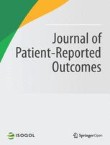We are pleased to announce that all articles published in Journal of Patient-Reported Outcomes are included in the Emerging Sources Citation Index, Web of Science, Scopus, PubMed, PubMed Central and DOAJ.
Importance of peer review – request for reviewers
The Editors of Journal of Patient Reported Outcomes would like to encourage readers to sign up to become reviewers for the journal. Please click the heading to find out more.
Patient and Public Involvement and Engagement
Edited by:
Olalekan Lee Aiyegbusi, MBChB, Ph.D., Centre for Patient Reported Outcomes Research, University of Birmingham, UK
Christel McMullan, MA, Ph.D., Centre for Patient Reported Outcomes Research, University of Birmingham, UK
Submission Status: Open until 31 October 2024
2024 ISOQOL Annual Conference
All different together: Showcasing variety of QOL research
13–16 October 2024 - Cologne, Germany
The 2024 Annual Conference will focus on the range of research done within the QOL field. Working within the framework of applications, methods and theory, we would like to turn to topics that might be less prominent. The plenaries will cover regulatory issues in digital health services, non-PRO measures and their technological applications, and the concept of HRQL from a more philosophical perspective.
Important Dates
- 29 January 2024: Workshop and Symposium Abstract Submissions Due
- 8 April 2024: Oral, Brief & Poster Presentation Abstract Submissions Due
- 17 May 2024: Scholarship Applications Due
2024 ISOQOL MWM Symposium
Measuring What Matters in social determinants of health
16-17 July 2024, Virtual event
There is an established link between differences in social determinants of health (SDOH) and chronic disease disparities, and between chronic disease and health-related quality of life (HRQL). Far less is known about associations among SDOH, HRQL, chronic disease and health outcomes, including whether SDOH mediate the relationship between HRQL and chronic disease outcomes. This symposium proposes to highlight conceptual relationships among these concepts, stimulate research ideas including novel methodologies to analyze relationships between SDOH, and HRQL for people with chronic illness.
For more information about the symposium, click below!
Journal of Patient-Reported Outcomes operates a double-blind peer-review system and further details are available in our peer review policy. If you are new to peer review, you can read an overview of the peer review process and its benefits. Also, please see resources for reviewers, including training and tutorials, and information about receiving recognition for your involvement.
Peer-review-
-
Developing the EPI Symptom Questionnaire (EPI-SQ): a qualitative study to understand the symptom experience of patients with exocrine pancreatic insufficiency (EPI)
-
Translation, cross-cultural adaptation, and psychometric validation of the Malay version of the Assessment of Quality of Life—6 Dimensions (Malay-AQoL-6D) instrument among Malaysians living with chronic heart failure
-
Identification of the most relevant aspects of spinal muscular atrophy (SMA) with impact on the quality of life of SMA patients and their caregivers: the PROfuture project, a qualitative study
-
Sleep-loss related to itch in atopic dermatitis: assessing content validity and psychometric properties of a patient-reported sleep-loss rating scale
-
Towards the use of mixed methods inquiry as best practice in health outcomes research
-
Describing the emotional exhaustion, depersonalization, and low personal accomplishment symptoms associated with Maslach Burnout Inventory subscale scores in US physicians: an item response theory analysis
-
What is an estimand & how does it relate to quantifying the effect of treatment on patient-reported quality of life outcomes in clinical trials?
-
How do patient reported outcome measures (PROMs) support clinician-patient communication and patient care? A realist synthesis
-
Measurement of alienation among adolescents: construct validity of three scales on powerlessness, meaninglessness and social isolation
Indexing
Aims & Scope
The Journal of Patient-Reported Outcomes (JPRO) is an international, open access, multi-disciplinary journal publishing original manuscripts in the field of patient-reported outcomes (PRO). JPRO will consider original research and review articles, brief communications, commentaries, and reviews of recent books and software advances relevant to the following topics:
- PROs in clinical trials
- PROs in clinical practice
- Patient, family, community, and public engagement
- Quantitative and qualitative studies on the development and application of PROs.
- Studies of the social and behavioural determinants of health using PRO measures.
- Patient-Reported Experience Measures.
The journal uses the ISOQOL Dictionary of Quality of Life and Health Outcomes Measurement definitions of PROs, PROMs and PREMs.
In general, JPRO does not publish case reports, articles reporting study designs, pilot studies, or feasibility studies.
Aims & ScopeLatest Tweets
Your browser needs to have JavaScript enabled to view this timeline
Promoting your article
Once your paper is accepted and published in Journal of Patient-Reported Outcomes, increase your reach by tweeting the link to your published paper and tagging @ISOQOL and/or @JPRO_ISOQOL
Editors-in-Chief
Rasa Ruseckaite, PhD , Editor-in-Chief
Monash University in Melbourne, Australia
Elizabeth J. Unni, PhD , Editor-in-Chief
Touro College of Pharmacy, New York, USA
Read the full profiles here
About the Society
The International Society for Quality of Life Research (ISOQOL) is a global community of researchers, clinicians, health care professionals, industry professionals, consultants, and patient research partners advancing health related quality of life research (HRQL).
Together, we are creating a future in which patient perspective is integral to health research, care and policy.
- ISSN: 2509-8020 (electronic)
Follow
Annual Journal Metrics
-
Citation Impact 2023
Journal Impact Factor: 2.4
5-year Journal Impact Factor: 3.1
Source Normalized Impact per Paper (SNIP): 1.019
SCImago Journal Rank (SJR): 0.872Speed 2023
Submission to first editorial decision (median days): 10
Submission to acceptance (median days): 173Usage 2023
Downloads: 642,043
Altmetric mentions: 559
